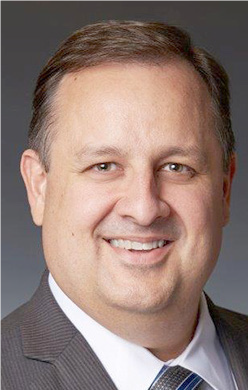Former head of Office of Governmental Ethics to discuss Trump’s business ties

On March 28, 2017, the Spahr Chair of Managerial Corporate Ethics Lecture Series will host Walter Shaub, former director of the United States Office of Governmental Ethics (OGE), in Gamble Auditorium in Kulas Hall to discuss the role of business ethics in governmental practice.
According to a press released posted on BW’s event website, Shaub has previously served as the Deputy General Counsel, supervising attorney, and staff attorney at the agency. Now, Shaub serves as the senior director of ethics at the Campaign Legal Center (CLC), according to the CLC’s website.
This particular subject is a new frontier for the Spahar Lecture Series, said David Krueger, sustainability and business ethics professor and current chair holder of the Charles E. Spahr Chair in Managerial and Business Ethics.
Typically, Kruger said, the lecture series features private sector leaders and CEOs, but he wanted to switch up the trend with regard to the current political climate.
“Governmental ethics has to do with rules and norms related to your role as a public servant, either as a civil servant appointed to a position or as an elected official,” said Tom Sutton, professor of political science at BW and the Burton D. Morgan chair in entrepreneurial studies.
Essentially, Sutton said that there are a variety of laws that date back to the drafting of the U.S. Constitution that dictate behaviors that are allowed in the private sector that are banned in the private sector of business.
Kruger said that, for example, a comparable situation strictly in the business realm is the development of a conflict of interest, whereby a manager of one company would seek to do business with another company that he or she owns. The situation presents the desire to conduct acts financially favorable to both businesses, without either being truly satisfied or compensated.
Regarding a combination of business and governmental relations, Sutton said, “what it boils down to is not gaining a particular benefit from your service in public office… You should be compensated if compensation is offered, but beyond that you shouldn’t be getting any under benefit from serving in a public office.”
Sutton said that at the federal level, these rules and regulations are fairly clear. Traditionally, a newly elected president will disengage with any extant business investments, mutual funds, stock ownerships, or other involvement.
The primary issue in the current governmental climate, as Kruger said, is that President Trump owns aspects of businesses all over the world, and the government as a whole is not sure how that plays a role in his presidency or the law.
“In the case of President Trump, the big issue has to do with the private holdings of the Trump company… and how that interrelates with public property and his office as president. Is that relationship potentially [isolating] the Emoluments Clause?” Kruger said.
According to Cornell University’s legal website, the Emoluments Clause – Article 1, Section 9, Clause 8 of the U.S. Constitution – “prohibits any person holding a government office from accepting any present, [benefit], office, or title from any ‘king, prince, or feign state’ without congressional consent.”
The clause was originally meant to prevent external influence and corruption of American offices by foreign states or entities, and has never been litigated in front of the Supreme Court as of June 2017, according to Cornell University.
Further complicating matters is the Trump business acquisition of an old post office building in Washington D.C., which was converted to one of Trump’s hotels.
“Some would suggest he is still gaining a lot of benefits because lots of diplomats, heads of state, interest group leaders, lobbyists… are purposely choosing [his] hotel to be seen… supporting [his] business, and hoping that will translate into something beneficial for them in dealing with [Trump] as the president and [his] delegates,” Sutton said.
Thus far, Sutton said that Trump has delegated most of his business dealings to his son, Donald Jr., in a blind-trust – a relationship meant to bar any and all communications between business dealings and the president to ensure policy changes are not enacted with the intention of benefiting any of the president’s businesses.
“One thing people forget is that the Trump organization is private… it is still a family owned business,” Sutton said.
Sutton said that the situation that has motivated the talk to be held on March 28 is one that the United States has never before experienced.
“We have never had a president with [Trump’s] level of business ownership… We’ve never had a billionaire president,” he said.
Regarding Walter Shaub’s position, Sutton said that Shaub continues to maintain the belief that Trump has not separated himself far enough from his business, and that students should expect the conversation to revolve around the concept of governmental ethics, its importance and difficulty as a determinant, and how Trump may be benefitting in ways that violate the Constitution.
The Exponent is looking for financial contributions to support our staff and our newsroom in producing high-quality, well-reported and accurate journalism. Thank you for taking the time to consider supporting our student journalists.










































